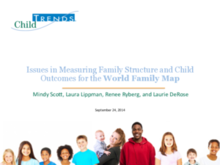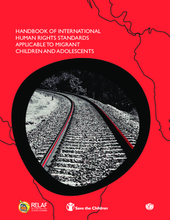Displaying 3521 - 3530 of 4420
A new blog has been posted on SOS Children’s Village’s website tackling the question “why do children enter alternative care?”
The Oak Foundation and The International Centre: Researching Child Sexual Exploitation, Violence and Trafficking at the University of Bedfordshire are supporting this 0.5 post to develop a greater focus on actions taken by young people to combat sexual violence against children, including strategies for developing youth participation undertaken by international service providers.
This presentation from the "The State of the Evidence on Children’s Care" symposium, by Mindy Scott, Laura Lippman, Renee Ryberg, and Laurie DeRose of Child Trends, discusses the World Family Map project and some of its findings related to children’s care.
SAVE THE DATE! Wednesday September 24th 2014, New York City
This animated video, made by Dr. Mike Evans, founder of the Health Design Lab at the Li Ka Shing Knowledge Institute, illustrates the impacts of trauma and negative experiences on young children’s brain development and the ways in which healthy cognitive development can be promoted.
Catholic Relief Services is seeking a qualified candidate for Capacity Building Technical Director (CBTD) for an anticipated USAID funded program on Comprehensive Care for Children Affected by HIV and AIDS (C3).
CRS is currently preparing for a potential global award in the area of social services and child protection called Comprehensive Care for Children Affected by HIV and AIDS (C3). In the event that USAID awards the grant to CRS, CRS is preparing to staff up.
Catholic Relief Services is seeking a qualified candidate for Evidence Building Technical Director (EBTD) for an anticipated USAID funded program on Comprehensive Care for Children Affected by HIV and AIDS (C3).
This conference is being organised by leaders in the field: Keeping Children Safe, Plan International, Save the Children, Terre des Hommes, UNICEF Nigeria, USAID and War Child. Participation is sought from across Africa and from international experts.
This report is aimed at synthesizing key concepts and standards regarding the protection of the rights of migrant children and adolescents in the Northern Triangle of Central America.


